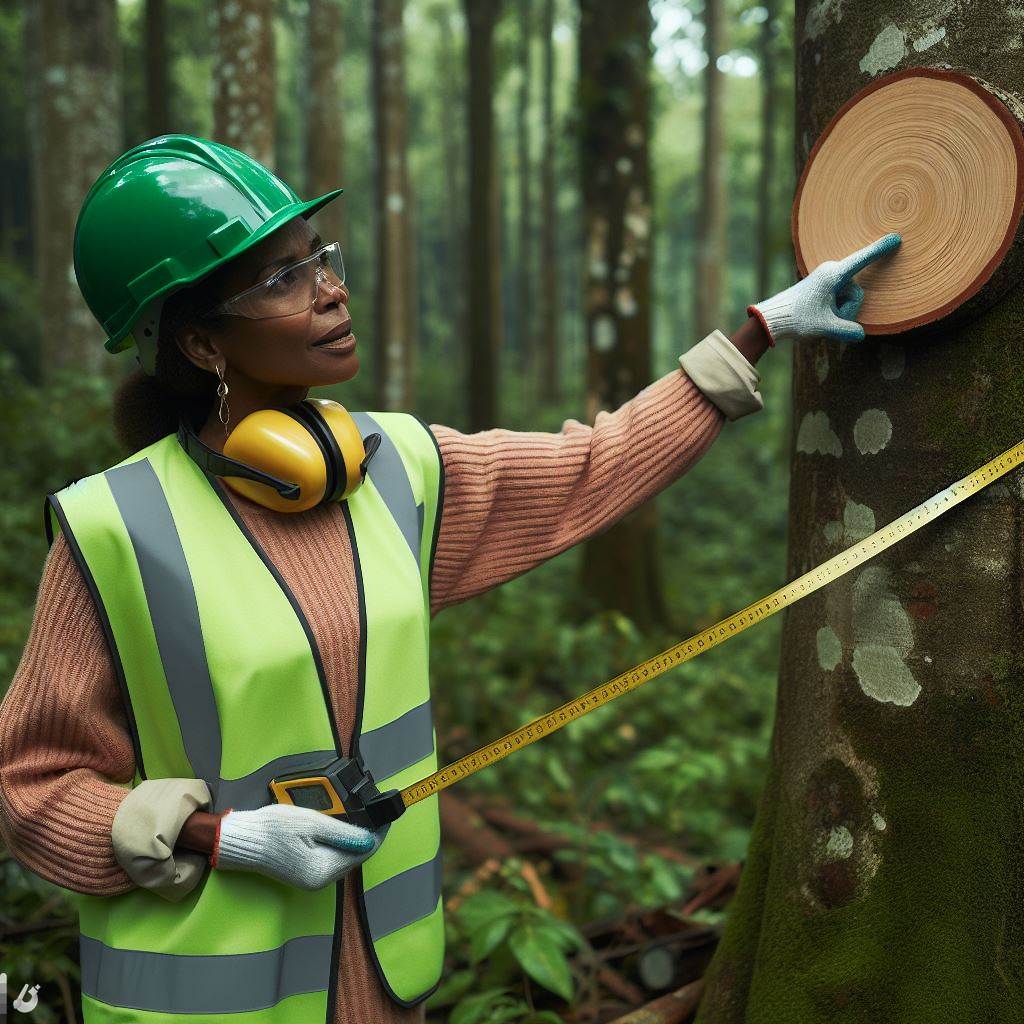Introduction
Overview of the forestry industry in Canada
Canada has a thriving forestry industry, encompassing both logging and processing of timber and other forest products.
Importance of forestry careers and their impact on the environment
Forestry careers play a vital role in sustainable forest management, conservation, and mitigating climate change.
Foresters are responsible for planning and implementing strategies to maintain healthy forests, prevent wildfires, and preserve biodiversity.
They also contribute to the economic growth of rural communities by ensuring sustainable timber harvesting.
The environmental impact of forestry careers extends beyond timber production and includes carbon sequestration and wildlife habitat preservation.
Professionals in this field strive to balance the needs of society, the economy, and the environment for long-term sustainability.
Forestry careers offer diverse opportunities, including forest management, research, wildfire management, and ecological restoration.
These careers require a combination of technical knowledge, fieldwork, problem-solving skills, and a passion for nature.
Furthermore, forestry professionals must stay updated with technological advancements in remote sensing, GIS, and forest inventory techniques.
Therefore, forestry careers are crucial for managing our precious forests and protecting the environment for future generations.
Read: Agricultural Education in Canada Today
Types of Forestry Careers
Forest Management
- Forest managers have various responsibilities, such as developing and implementing forest management plans.
- Education and qualifications required for forest management positions vary, but a bachelor’s degree in forestry is common.
- Forest management professionals can work for government agencies, private companies, or non-profit organizations.
Silviculture
- Silviculturists play a crucial role in forest regeneration and management, ensuring the sustainable growth of trees.
- Required skills and training for silviculture jobs include knowledge of plant biology, ecology, and forest management techniques.
- Silviculturists can pursue careers as forest technicians, forest managers, or even become consultants in the field.
Forest Engineering
- Forest engineers are responsible for designing and overseeing the construction of forest infrastructure and systems.
- Skills and education requirements for forest engineering jobs include a degree in forest engineering or a related field.
- Forest engineers can find employment in sectors such as logging companies, government agencies, and consulting firms.
Forest Research and Conservation
- Research plays a crucial role in sustainable forest management, providing data for informed decision-making.
- Career paths in forest research and conservation include positions such as forest ecologists, wildlife biologists, and conservation scientists.
- Professionals in this field contribute to environmental protection and policy development through their research and conservation efforts.
Most importantly, the field of forestry offers various career options for individuals passionate about the sustainable management and conservation of forest resources.
Forest management involves developing and implementing plans for effective forest stewardship.
Silviculturists play a key role in ensuring the regeneration and sustainable growth of forests.
Forest engineering focuses on designing and constructing forest infrastructure.
Forest research and conservation professionals contribute to the understanding and protection of forests for future generations.
Whether one chooses to work in forest management, silviculture, forest engineering, or forest research and conservation, each career path makes a valuable contribution to the environmental and societal well-being.
Read: A Day in the Life of a Canadian Forester

Progression in Forestry Careers
Entry-level Positions
Starting a career in forestry often begins with entry-level positions.
These initial roles provide individuals with valuable opportunities to learn and grow within the industry.
Common entry-level job titles and their roles
Common entry-level job titles include Forestry Technician, Forest Worker, and Conservation Assistant.
These roles typically involve supporting more experienced professionals in various tasks such as conducting surveys, collecting data, and performing maintenance on forestry equipment.
Skill development opportunities for beginners
Entry-level positions also offer skill development opportunities for beginners.
Through hands-on work, individuals can acquire knowledge in forest management, tree identification, and use of technical tools and equipment.
They also gain practical skills in data analysis and report writing.
Unlock Your Career Potential
Visualize a clear path to success with our tailored Career Consulting service. Personalized insights in just 1-3 days.
Get StartedImportance of networking and gaining practical experience
Networking and gaining practical experience are vital for career growth in forestry.
Building connections within the industry can lead to job referrals and opportunities for advancement.
Additionally, gaining practical experience through internships or volunteering demonstrates commitment and enhances the chances of securing higher-level positions.
Mid-Level Positions
After gaining experience in entry-level positions, professionals in forestry can progress to mid-level roles that offer higher levels of responsibility and decision-making power.
Advancement opportunities for experienced professionals
Mid-level positions provide advancement opportunities for experienced professionals.
This may include titles like Forest Supervisor, Natural Resource Manager, or Forest Planner.
These roles involve leading teams, managing forest resources, and coordinating operations.
Roles with greater responsibilities and decision-making power
Mid-level forestry careers come with greater responsibilities and influence.
Professionals in these positions often contribute to strategic planning, policy development, and implementation of forest management practices.
They also play a vital role in ensuring compliance with environmental regulations.
Professional certifications and additional education options
Attaining professional certifications and pursuing additional education can boost career progression in mid-level forestry positions.
Certifications such as Certified Forester or Certified Wildlife Biologist demonstrate expertise and credibility.
Advanced degrees in forestry or related fields provide in-depth knowledge and open doors to leadership roles.
Top-Level Positions
At the pinnacle of forestry careers lie top-level positions that encompass leadership roles and the opportunity for significant influence on the industry.
Leadership roles in forestry careers
Top-level positions include titles like Forest Director, Chief Forester, or Executive Director of Conservation.
These roles involve leading organizations, setting strategic goals, and overseeing major projects.
Responsibilities in policy-making and strategic planning
Professionals in top-level positions often hold responsibilities in policy-making and strategic planning.
They work closely with government agencies, environmental organizations, and stakeholders to shape forest management policies that prioritize sustainability and conservation.
Potential for consultancy and entrepreneurship
Top-level forestry careers may also offer opportunities for consultancy and entrepreneurship.
Seasoned professionals with extensive knowledge and experience can provide expert advice to governments, organizations, or private businesses.
They may also start their own consulting firms or forestry-related enterprises.
Overall, progression in forestry careers entails starting from entry-level positions, advancing to mid-level roles with more responsibilities, and ultimately reaching top-level positions.
Skill development, networking, and gaining practical experience are crucial at every stage, and continuous education and certifications enhance career growth.
Read: Env. Engineering: Ethics and Responsibilities
Explore Further: Farmers’ Markets Impact in Canada
Challenges and Opportunities
The forestry industry faces both challenges and opportunities as it navigates a rapidly changing world.
Environmental Concerns
The impact of climate change on forestry careers is a pressing concern.
Alterations in temperature, precipitation patterns, and extreme weather events directly affect forest ecosystems.
Forestry professionals must develop strategies to mitigate the negative impacts and ensure the long-term sustainability of forests.
Moreover, sustainable forestry practices are necessary to adapt to changing landscapes.
As climate change alters forest compositions and species distribution, professionals must understand the ecological dynamics and adopt practices that promote resilience and biodiversity.
This includes sustainable harvesting techniques, reforestation efforts, and the conservation of unique ecosystems.
Technological Advancements
The forestry industry is experiencing a wave of technological advancements that are transforming traditional practices.
Automation and digital tools are being incorporated throughout the sector, improving efficiency and accuracy.
Drones and satellite imagery assist in forest management, allowing professionals to monitor forest health, detect pest outbreaks, and plan interventions more effectively.
As technological advancements reshape the industry, forestry professionals need to evolve their skillset and embrace new opportunities for training.
For example, proficiency in geographic information systems (GIS) and remote sensing is increasingly important for data analysis and decision-making.
Continuous upskilling and professional development help individuals stay relevant in a rapidly evolving sector.
Indigenous Collaboration and Partnerships
Engaging Indigenous communities is vital for sustainable forestry practices.
Indigenous peoples have traditionally lived in harmony with forests, possessing invaluable knowledge and cultural practices that contribute to forest conservation.
Including Indigenous perspectives in decision-making processes leads to more holistic and ecologically sound forest management strategies.
Collaboration with Indigenous communities also presents opportunities for cultural integration.
By recognizing and respecting Indigenous rights, traditional knowledge can be integrated into forestry practices, leading to more inclusive and equitable approaches.
This collaboration benefits both the industry and Indigenous communities by fostering economic opportunities, promoting cultural preservation, and strengthening relationships.
In short, the challenges faced by the forestry industry in the face of environmental concerns, technological advancements, and collaboration with Indigenous communities also present opportunities for growth and innovation.
Adapting to climate change, embracing technological tools, and working closely with Indigenous peoples will ensure a sustainable future for forestry careers.
Read: Canadian Env. Engineers in Global Projects
Conclusion
“Forestry Careers: Paths and Progressions,” let’s recap the diverse and dynamic journey within this field.
- Career Paths Recap: From forest management to research, forestry careers offer a broad spectrum of opportunities for passionate individuals.
- Encouragement to Explore: Aspiring professionals are encouraged to explore the rich diversity of roles within forestry careers, from conservation to policy.
- Significant Role Emphasis: Forestry professionals stand as stewards of environmental sustainability, safeguarding forests and contributing to a greener future.
Embark on your forestry career with a renewed understanding of the myriad paths available and the impactful role you can play in environmental stewardship.
Explore, learn, and contribute to the sustainability of our planet through the diverse opportunities forestry careers offer.




